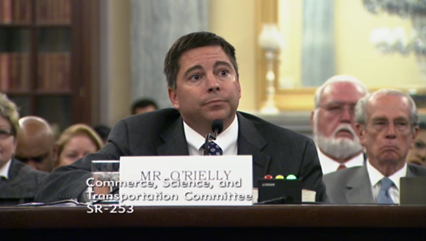O'Rielly To FCC: Don't Put Your Head In the Sand
The smarter way to stay on top of the multichannel video marketplace. Sign up below.
You are now subscribed
Your newsletter sign-up was successful

Commissioner Michael O'Rielly is likening the Federal Communications Commission to an ostrich in its response to massive marketplace changes -- stubbornly sticking its head in the sand rather than speeding (an ostrich can do 45 mph) to modify its rules to reflect those new realities.
That came in a speech to The Media Institute in Washington Thursday (June 19).
The reality, he said, is that content platforms have proliferated far beyond the days when broadcasting was the only game in town. Content is king, he said, particularly high-quality, high-value content -- Mad Men, Game of Thrones, Downton Abbey, sports programming, local news -- that is becoming more expensive to produce, particularly as the ad pie is being sliced and diced.
"I worry the FCC is desperately clinging to existing rules -- rules that were written prior to the digital revolution, prior to Wi-Fi, and prior to the Internet," he said.
He conceded that many of the rules were the result of statute, but that there was more the FCC could do and needed to do, or not to do, to start running with the ostriches rather than joining them in the head-burying department.
He broke out those his concerns by category.
Broadcast Ownership. O'Rielly took aim at FCC chairman Tom Wheeler's decision to combine the 2010 and 2014 statutorily-mandated regulatory reviews into one, now targeted for June 2016. "I worry the FCC is desperately clinging to existing rules—Rules that were written prior to the digital revolution, prior to Wi-Fi, and prior to the Internet," he said. "I would challenge anyone to look in the mirror and with a straight face say that we need to tighten the media ownership rules..." he said. "But instead of helping these struggling stations, the FCC effectively outlawed JSAs in the media ownership order earlier this year and gave the existing JSAs in the marketplace a short time to unwind. This tightened, rather than loosened, the ownership rules. And the FCC did this without even giving a sideways glance at the underlying duopoly rule."
The smarter way to stay on top of the multichannel video marketplace. Sign up below.
He cited Sinclair's restructuring of its deal to buy Allbritton stations which the FCC still has not weighed in on after a year, calling it a devastating example of the FCC's "misguided" decision on JSA's.
"Sinclair Broadcasting announced its intention to turn in three television station licenses to the FCC because they were unable to operate these stations without the JSA structure or sell them," he said. "In other words, these stations are going dark and television viewers in two markets are being harmed with the loss of three local stations."
Sinclair said it was doing so to try and get the FCC's approval before a July deadline for either party to bail on the deal. He also said the FCC should not finalize its proposal to scrap the UHF discount unless it does so as part of an overall review of the ownership rules.
Sports Blackout Rule. The FCC has already voted unanimously in December to propose getting rid of the Sports Blackout Rule, but the issue has heated up of late as stakeholders backing that decision are looking for an order to be circulate so it can be officially scrapped. The rule prevents pay providers from carrying games blacked out on broadcast TV due to league policies having to do with keeping stadiums filled. Since the leagues can still prevent that carriage contractually, O'Reilly says that is one FCC rule that could be changed "without having any demonstrable effect." Broadcasters and the NFL argue otherwise." Instead of using the FCC as a tool to protect the NFL and its revenues, the league and local broadcasters should continue to find ways to ensure consumers have access to content."
MVPDs. O'Rielly says the FCC should not try to force a la carte, saying the marketplace is already moving in that direction in response to consumers. But he also suggests the FCC should not get into the middle of retrans--cable operators have been pushing the commission for retrans reforms. "[T]he FCC should avoid becoming involved in rate disputes for video offerings," he says. "The commission is ill-equipped to determine fair market rates."
He also said the FCC should initiate a rulemaking to reform the FCC's effective competition finding, saying the FCC standard is "unnecessarily onerous."
Online video distribution. O'Rielly warned the FCC against "reflexively" applying legacy regs to online video distributors, saying it would undermine the fledgling services and limit the "valuable competition" they provide.
Contributing editor John Eggerton has been an editor and/or writer on media regulation, legislation and policy for over four decades, including covering the FCC, FTC, Congress, the major media trade associations, and the federal courts. In addition to Multichannel News and Broadcasting + Cable, his work has appeared in Radio World, TV Technology, TV Fax, This Week in Consumer Electronics, Variety and the Encyclopedia Britannica.

